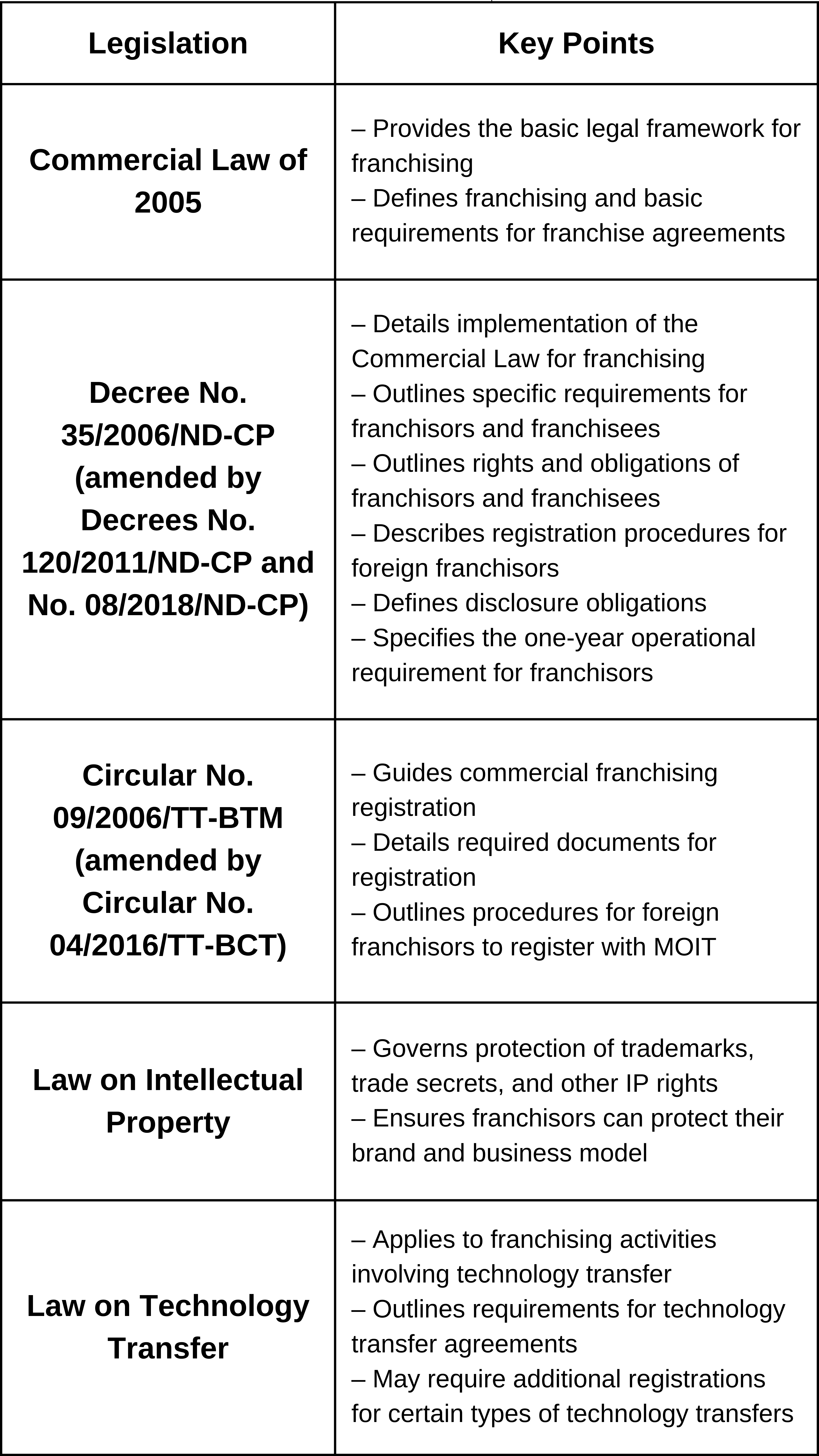I. How to Successfully Launch a Franchise in Vietnam
Discover the potential of franchising in Vietnam. Explore the opportunities and benefits of starting a franchise in this thriving market. Did you know foreign franchises can expand into Vietnam’s increasingly strong consumer market? With the right approach, this can be a strategic approach to build a strong presence in this dynamic market.
However, setting up a franchise in Vietnam requires careful navigation of local regulations. This guide outlines key legal requirements and practical steps to help you confidently establish and grow your franchise.
II. Regulatory Framework for Operating a Franchise in Vietnam
Before launching a franchise in Vietnam, you must comply with the country’s legal framework, which governs registration, contracts, and operational requirements. Remember that there are several laws in Vietnam that contain clauses overseeing the operations of a franchise:

III. Key Requirements for Opening Foreign Franchises in Vietnam
1. Pre-requisites and Required Documents for Franchising in Vietnam
To establish a franchise in Vietnam, you must meet certain prerequisites. Failing to comply with these regulations can lead to severe penalties, forced suspension of operations, and potential legal disputes that could jeopardize your business:
• The franchise system must have been operational for at least one year.
• For sub-franchising, the master franchise must be operational in Vietnam for at least one year.
• The brand and products/services offered must not be on the government’s prohibited list.
Additionally, as part of the registration process, you will need to have the following documents on hand:
• Franchise Registration Application
• Power of Attorney
• Franchise Agreement
• Previous Year’s Audited Reports
• Brief introduction of the franchisor
• Business Certificate
• Trademark or Copyright Certificates
• Approval from the primary franchisor (for sub-franchising)
2. Franchise Agreement Between the Franchisee and the Franchisor
A strong franchise agreement is the backbone of a successful franchise in Vietnam. It defines the rights and responsibilities of both the franchisor and franchisee, ensuring smooth operations, brand consistency, and legal protection. A well-crafted agreement not only safeguards your business but also strengthens your partnership with franchisees.
To comply with Vietnamese regulations, your franchise agreement must be written in Vietnamese and include the following details:
• Franchising fees, royalties, and payment methods
• Intellectual property rights
• Operational guidelines
• Duration of franchising
• Dispute resolution procedures
• Renewal and termination clauses
IV. Setting Up A Foreign-Owned Business Franchise in Vietnam
1. How to Set Up A Foreign-Owned Franchise
There are three ways you can enter the Vietnamese market, each offering its advantages and requirements based on your business activities or needs. The right approach depends on factors such as operational control, investment capacity, and regulatory considerations:
1. Franchising From Abroad Without A Local Entity: This allows you to enter the Vietnamese market without establishing a physical presence in the country. It requires a local partner to set up the franchise and handle any subcontracts.
2. Acquiring A Local Company: The company must be operating for at least one year. It may require extra due diligence to assess the local company’s financial health and legal compliance beforehand.
3. Setting Up A Foreign Direct Investment (FDI) Company: A Limited Liability Company is the most common option for this. However, it requires an approval letter from the People’s Committee where you are setting up the franchise. Plus, you must obtain an Investment Registration Certificate (IRC) and Enterprise Registration Certificate (ERC).
2. Legal Responsibilities of A Franchise Owner
Once your franchise is established in Vietnam, staying compliant with local regulations is essential for smooth operations. As a franchise owner, you must meet both franchisor standards and government requirements. Key legal obligations include the following:
• Compliance with Franchise Agreement: Adhere to operational standards and guidelines set by the franchisor. Pay franchise fees, royalties, and other required payments on time.
Employment Law Obligations: Ensure fair treatment of employees and maintain accurate payroll records.
• Financial and Reporting Obligations: Maintain accurate financial records and submit timely financial reports to the franchisor as required. Pay taxes and comply with tax regulations while adhering to accounting standards and practices.
• Legal and Regulatory Compliance: Obtain necessary licenses and permits for the business and comply with industry-specific regulations.
• Intellectual Property Protection: Use the franchisor’s trademarks, logos, and other intellectual property as specified in the agreement while protecting confidential information and trade secrets.
• Marketing and Advertising: Participate in marketing initiatives as required by the franchisor and adhere to advertising guidelines and standards set by the franchisor.
• Training and Operations: Attend required training sessions provided by the franchisor, implement and maintain operational standards as outlined in the franchise manual, and ensure proper training of employees.


